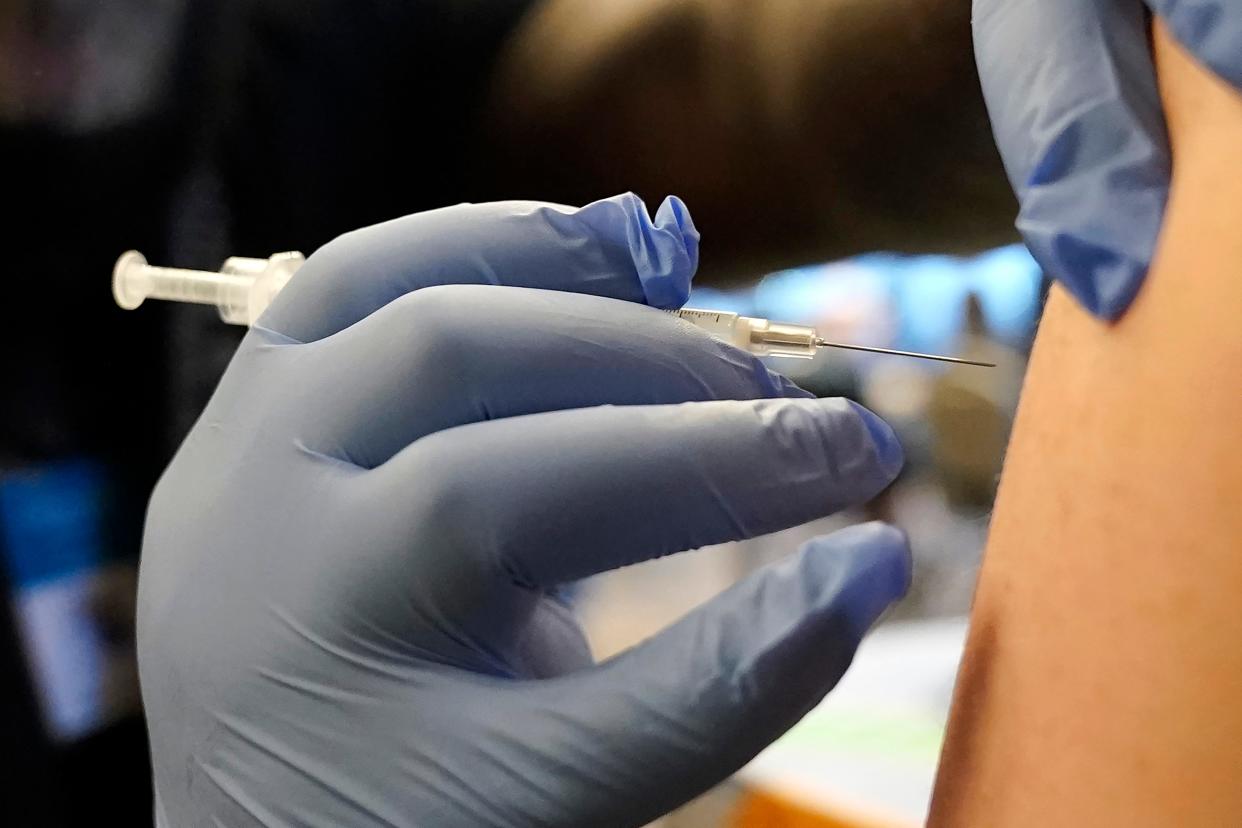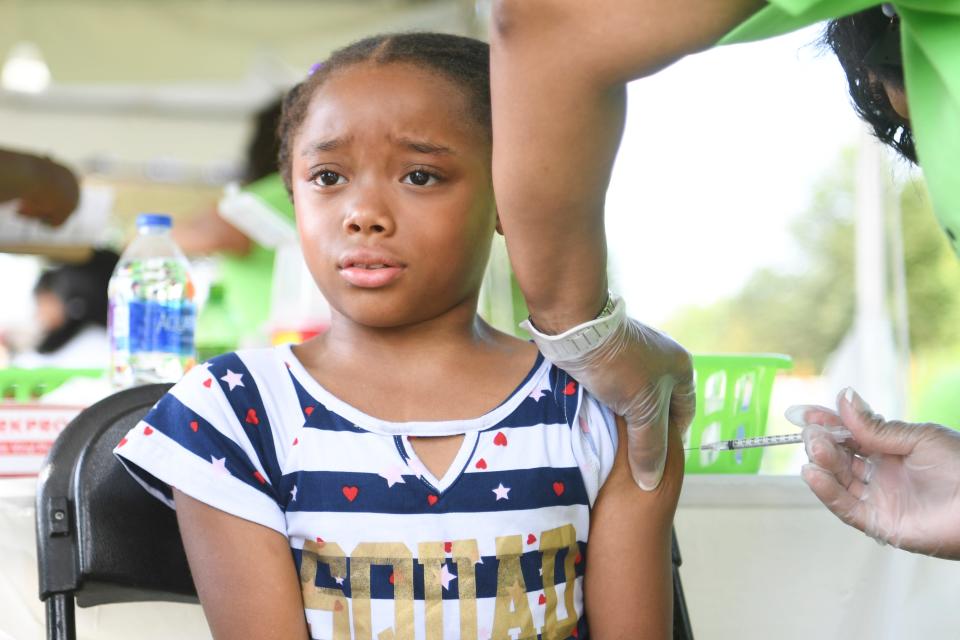New COVID-19 vaccines are on the way. Here's what you should know

- Oops!Something went wrong.Please try again later.
New COVID-19 vaccines are on their way to doctors' offices and pharmacies, you may have heard. But you might wonder, should you get one? What's different here? What else should you know?
The Enquirer reached out to Dr. Robert Frenck, director of the Cincinnati Children's-based Vaccine Research Center which has tested numerous COVID-19 vaccines, for answers. The center has more than 2,900 volunteers currently enrolled in 29 active studies, 14 of which are focused on COVID vaccines. Frenck has been involved in studies of vaccines for COVID-19 from the start.
Why am I hearing about a new COVID booster?
The U.S. Food and Drug Administration's advisory committee gave updated mRNA COVID-19 vaccines from Pfizer Inc. and ModernaTX Inc. a thumbs up authorization for emergency use on Monday. The Centers for Disease Control and Prevention's Advisory Committee on Immunization Practices agreed with the FDA board on Tuesday. New vaccines are on the way that are formulated to "more closely target" variants that are circulating now, adding protection against the need for hospitalization for symptoms or death.
The vaccines aren't technically "boosters," because they are different from previous vaccines, rather than a rubber-stamp. Their formulation includes a monovalent (or single) vaccine against the Omicron variant XBB.1.5.
Will the new vaccines, designed to protect against variant XBB.1.5, also protect from other variants?
Yes, said Frenck, the new vaccines can protect from other COVID-19 variants that are omicron variants. As long as the virus mutations are not dramatically different, he said, they will work.
The U.S. FDA released a statement saying that evidence shows the new vaccines will protect against the virus:
"The updated vaccines are expected to provide good protection against COVID-19 from the currently circulating variants. Barring the emergence of a markedly more virulent variant, the FDA anticipates that the composition of COVID-19 vaccines may need to be updated annually, as is done for the seasonal influenza vaccine."
Who should get the new vaccines? Why?
"Everybody should get vaccinated," Frenck said. "Just like everybody should be vaccinated for the flu."
He also recommended that people check with their own doctor, or their child's pediatrician, for eligibility, timing and to answer any questions you may have.
As with other COVID-19 vaccines, he said, you can still get the virus if you get the shot.
But there's a difference, Frenck said, between getting that infection and developing disease.
"The likelihood of being hospitalized or dying is dramatically lower if you’re vaccinated," he said.
Frenck said that even young, healthy adults should get the vaccine because, first, no one knows who might be at risk for severe symptoms from COVID-19, and because it helps protect others from getting the infection and developing severe symptoms that could prove deadly.
"We’re trying to keep society healthy,” he said. "COVID is a public health issue. If we could prevent one person from dying, it would be a good thing."

What if I have had COVID-19 recently? Should I still get a vaccine, or should I wait?
Those who have recently had COVID-19 should wait until their symptoms are gone, then wait another couple of weeks, before getting one of the new vaccines, Frenck said.
"It is not going to hurt you to get the vaccine if you recently had COVID – but wait till you get better," he said. "For example, if you had COVID in August and you're getting the vaccine a month later in September or a couple months later in October, that's fine. Your immune system will respond perfectly well to it."
He also said that the older vaccines were in short supply when they were first out. Medical professionals suggested waiting 90 days after contracting COVID-19 before getting vaccinated mainly because people who'd been infected had built up some antibodies.
What do you think of the recent climb in COVID-19 cases in Ohio?
COVID-19 cases in Ohio climbed steadily during the month of August, from a two-week statewide average of 34.7 per 100,000 reported Aug. 3 to 129.6 per 100,000 reported Sept. 6, according to the Ohio Department of Health data dashboard.
“I don’t think we’re going to see another world-burning (pandemic) like we did three years ago," Frenck said. "It’s more an endemic virus, in my opinion.”
"COVID-19 isn't what it was in 2020, and it isn't even close to what it was at its peak," Frenck said. That's because people who've had the infection have built up antibodies, and people have been vaccinated.
Still, he said, people should take it seriously.
The U.S. FDA offers this guidance on new COVID-19 vaccines
Anyone 5 years and older may receive a dose of an updated mRNA COVID-19 vaccine as long as it is at least two months since the last dose of any COVID-19 vaccine.
Infants and toddlers from 6 months through 4 years old who've previously been vaccinated against COVID-19 are eligible to receive one or two doses of an updated mRNA COVID-19 vaccine with timing and number depending on the previous vaccine received. Check with your child's pediatrician.
Infants 6 months through 4 years who are unvaccinated against COVID-19 are eligible to receive three doses of the updated authorized Pfizer-BioNTech COVID-19 vaccine or two doses of the updated authorized Moderna COVID-19 vaccine. Again, check with your child's pediatrician.
What about my other annual vaccines?
Frenck suggests everyone get not only the updated COVID-19 vaccine but also get vaccines for flu and RSV this fall if they are eligible to do so.
Again, he encouraged people to check with their family doctor on what to get and when.
There's no harm in getting all three vaccines at the same time, Frenck said, but you may end up with sore shoulders for a day or so.
This article originally appeared on Cincinnati Enquirer: New COVID vaccine availability: What to know

